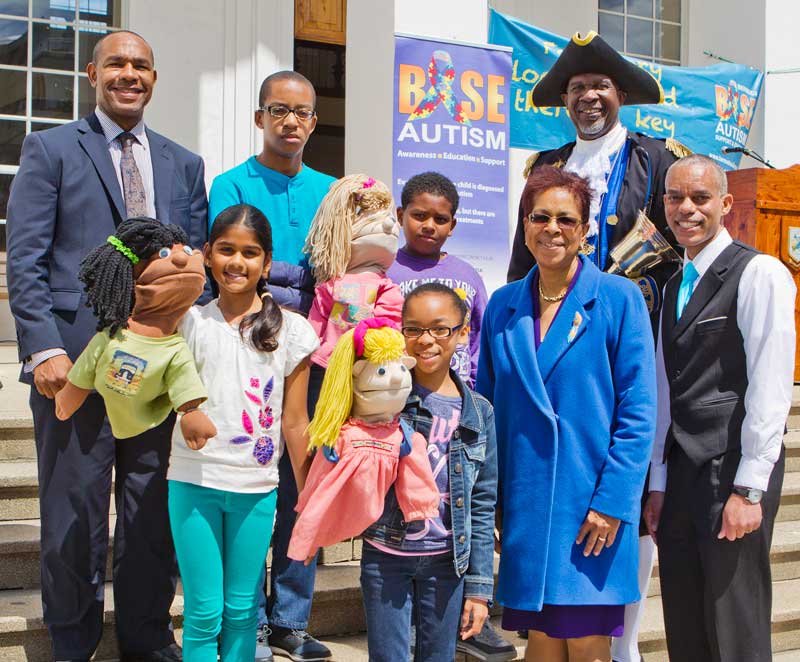Health Minister Proclaims Autism Awareness Day
Health Minister Jeanne Atherden today [Apr 2] proclaimed World Autism Awareness Day, marking the beginning of Autism Awareness Month in Bermuda.
Minister Atherden read the official UN declaration celebrating the eighth annual World Autism Awareness Day, which was established following a 2007 United Nations resolution. It is one of only three official condition-specific United Nations Days and aims to bring the world’s attention to Autism Spectrum Disorder [ASD], which affects tens of millions of people worldwide.
The community event, organised by Bermuda Autism Support & Education [BASE] took place on the steps of City Hall in Hamilton and also featured a musical performance by the Prospect Primary School and a speech by Ahmani Peets, a 12-year-old honour roll student at Whitney Institute who is on the autism spectrum.
The Minister said that autism “affects all people regardless of race, religion, socio-economic status or geography. The incidence of autism worldwide is increasing, affecting 1 in every 100, I in 54 boys and 1 in 68 girls. A child is diagnosed with autism every 20 minutes.
“The aims for World Autism Awareness Day are to inform the general public about the global health crisis of autism, stress the importance of early diagnosis and early intervention, and to celebrate the unique talents and qualities of individuals with autism.
“Autism is a lifelong condition for which the bulk of the cost falls in adulthood, creating an enormous economic impact.”
Anthony Peets, President of BASE, said the organisation is committed to awareness, advocacy, and education, and ensuring that the best services are available and accessible. BASE also holds regular professional development seminars for parents and professionals, and provides parents with emotional support and advice.
Mr. Peets said, “Autism is not a disease and there is no cure, as it is a neurological and developmental condition. Autism affects four areas – difficulty with social interaction, speech and sensory needs, love of routines, and special interests.
“We know that with early intervention, we are able to impact the crucial areas of learning. BASE continues to work with community and government partners to improve the services to families with children on the spectrum.
“We now have three public primary schools and one middle school with trained teachers and para-educators. The students are assessed and programming is tailor-made and reassessed often as they progress.
“We work to see that these students are mainstreamed into regular classrooms as often as possible so that they gain the crucial learning skills. Many can cope with the academic expectations with relevant modifications and support.”
Read More About
Category: All



The people of Bermuda need to be aware that the chemicals in some of the pesticides used in Bermuda can cause AUTISM…..
http://www.globalresearch.ca/autism-and-the-health-impacts-of-monsanto-glyphosate-roundup-on-children-research-scientist-at-mit/5421901
The WHO declared Glyphosate a health hazard. The same is true of the United Nations
http://www.fool.com/investing/general/2015/03/26/did-the-un-just-damage-this-5-billion-monsanto-bus.aspx